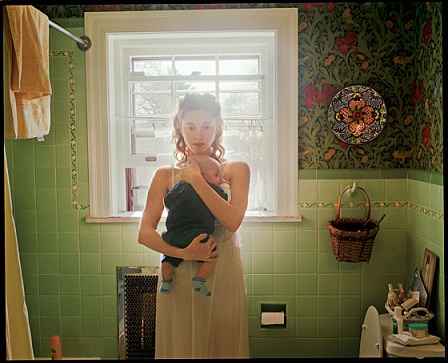Maushart decided to unplug the family because the kids — ages 14, 15 and 18 when she started The Experiment — didn't just "use media," as she put it. They "inhabited" media. "They don't remember a time before e-mail, or instant messaging, or Google," she wrote.
Maushart wrote that her kids "awoke slowly from the state of cognitus interruptus that had characterized many of their waking hours to become more focused logical thinkers."
The real form of the question, the one that generates the correct answer simply in its asking, is, "why doesn't having kids-- or getting married or getting a better job or getting laid or anything else I try to do-- make me happy? Oh. I get it. I'll shut up now."
I was sure that color coordinating the baby and the bathroom would make me happier but it didn't... should I have gone with lavender?
This intriguing media criticism suggests not just that the article's subjects are self-absorbed, but the journalists themselves. The Last Psychiatrist calls such articles "cognitive parasites" because even if one disagrees with the articles' conclusions, they can change the way one thinks.
I chose to leave the Peas in Las Vegas, as they kicked off their recent U.S. leg of the tour. I felt like a lumberjack in the Redwood Forests—-great money, but you’re getting paid to decimate an irreplaceable resource. In my case, it was the higher cortical functioning of every youthful brain behind the barricade. Where the lumberjack gazes out over fields of enormous tree-stumps, I saw arenas packed to the nosebleeds with dancing brain stems. So I retreated as a conscientious objector. This has provided a modicum of inner peace.
Net of a large number of social and demographic factors, more intelligent children grow up to be more nocturnal as adults than less intelligent children.
Compared to their less intelligent counterparts, more intelligent individuals go do bed later on weeknights (when they have to get up at a certain time the next day) and on weekend (when they don’t), and they wake up later on weekdays (but not on weekend, for which the positive effect of childhood intelligence on adult nocturnality is not statistically significant).
For example, those with childhood IQ of less than 75 ("very dull") go to bed around 23:41 on weeknight in early adulthood, whereas those with childhood IQ of over 125 ("very bright") go to bed around 00:29.
Looking at that Sunday morning sleep-in time, I'm still trying to figure out if this article is a joke. :-)


